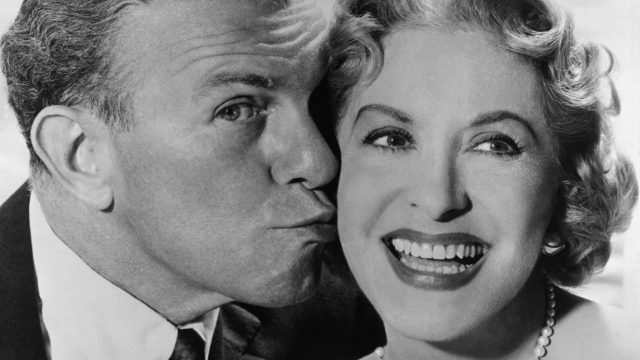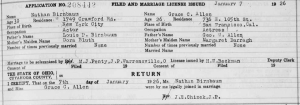According to George Burns, Gracie was once set up to work with a different straight man, I don’t remember why. Maybe George was sick or something; maybe he was deemed not popular enough, which would’ve made it early in their career. (I think it was in their vaudeville days.) The guy asked for the script to their act so he could learn it. George told him, “There’s no script. I ask Gracie about her brother and she talks for five minutes.” The guy asked what he would do if they had a ten-minute slot, and George said, “I ask Gracie about her brother and she talks for ten minutes.”
Grace Ethel Cecile Rosalie Allen was born to an Irish Catholic family in San Francisco, California, in [mumble mumble]. At some point after her birth, the vital records held by the city and county—they’re the same thing—were destroyed. Her tombstone says 1902, the date presumably provided by George. Who said he didn’t know how old she was. Census data strongly indicates that she was in fact born in 1895. Which would have made her a hair older than George, in fact. But the ages of women in entertainment are a whole Thing, and Gracie was able to make the earthquake into a joke and dodge the question.
Which is impressive, given she was an entertainer starting as a child. You’d think the difference between three and eight would be noteworthy, but here we go. She and her sisters formed a dancing act, the Four Colleens, doing Irish folk dances. Then she met George, and she married him onstage at the Palace Theater in Cleveland, which is about the most vaudeville story I’ve ever heard. It was 1926, and I was able to find the marriage license, because the internet is a wonder. She was listed as being 26, two years older than George would later have put on her tombstone.
Gracie, though, is underrated. George had to completely redo the act when Gracie retired. He’d been the straight man for years, because Gracie got all the laughs anyway. She was, let’s be real, a natural comedienne. She was almost effortlessly funny, and she’s basically forgotten today because George kept going for so long. She retired because of health problems, not—as legend has it—because the rise of color television would have revealed her heterochromia. The show ended in 1958, and she died in 1964, having had minor heart attacks for years.
Reading between the lines, I think Gracie was a quiet, introverted woman who really enjoyed performing and then wanted to be left alone. I know a performer like that. She had been scalded badly as a child and had a severe scar on one arm that she always kept covered. She may not have quit acting over the heterochromia, but apparently she was self-conscious about it. She seems to have kept performing longer than she might have liked out of love, but she was a joy. You miss so much by not catching up on her.
Reward me for tracking down this record by supporting my Patreon or Ko-fi!


